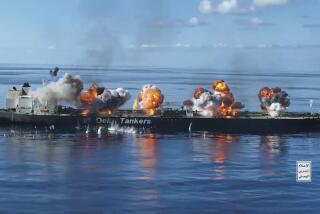To Marooned Seamen, It’s a Bad Dream : Hawaii: Two dozen Ukrainians are on a disabled ship with reeking fish meal. After nearly three months, they still await help.
- Share via
HONOLULU — Seeing signs of Christmas all around this economic hub of the Pacific has made Mikhail Yavtushenko wistful for a Ukrainian-style Noel, with family gathered around a table laden with roast duck stuffed with apples, beef ribs and dried prunes.
“I dream of it every night,” said the 49-year-old lifelong seaman with piercing blue eyes and a handlebar mustache. “But I do not know when I will be getting home.”
Yavtushenko is among 24 impoverished Ukrainian crewmen stranded aboard a damaged vessel carrying 13,000 tons of reeking, combustible fish meal--only a short swim from the glistening skyscrapers rimming Honolulu Harbor.
With hardly a cupon to their names and surviving on donated food and water, they have languished aboard the disabled, 17,000-ton Grigoriy Kozintsev since it was towed here Sept. 23 with a broken main engine--victims of a Byzantine international legal wrangle over the $8-million cargo.
Business and insurance firms in Australia, London, Tokyo, New Orleans, Hawaii and Ukraine--as well as state harbor officials, federal customs and immigration authorities and the U.S. Coast Guard--are all at odds over who is ultimately responsible for the delay and what to do with the huge vessel that broke down 350 nautical miles northeast of Hawaii.
A lawsuit filed by the Japanese owners of the Chilean fish meal had the cargo “arrested,” and partial shipment began last week in separate vessels. The commodity was offloaded on a distant pier to avoid inundating downtown Honolulu with its clinging odor.
But the fate of the crew remains undecided. And the 500-foot-long black and white vessel--with rust frothing out of the peeling paint on its scuffed hull--serves as a symbol to some here of the dysfunction in Ukraine as it sluggishly shifts toward a free-market economy.
At the root of the problem is a former Soviet republic that is virtually bankrupt, with a rotting merchant marine fleet that it can ill afford to keep in good repair, much less rescue half an ocean away.
All but abandoned by their government, the marooned men hope and wait--and try to relieve the boredom by walking along nearby city streets with empty pockets and embarrassment etched on their sunburned faces.
These fiercely proud sailors, formerly confident of their ability to meet any problem on the high seas with a mix of brawn and mechanical know-how, find the very ship beneath their feet a crumbling hulk. Its engine needs at least $1 million worth of repairs.
And they are embarrassed that they have to rely on handouts even as their freight fouls the trade winds of this tropical resort and their ship takes up valuable berth space.
“There is a good social studies lesson to be learned here,” said Skip Neftel, a burly cargo surveyor and owner of O’Toole’s, a popular watering hole for mariners in Honolulu’s old Chinatown.
“This ship shows how the great power we learned to fear is in disarray; it is a microcosm of their society,” he said. “When the crew first arrived here, they were suspicious and paranoid, which is a hangover from the Cold War.”
It was in Neftel’s saloon a few weeks ago that local seamen decided to launch a donation drive for the sailors, whose stores were depleted of all but rancid meat and moldy vegetables.
Within a matter of hours, word traveled across the harbor like a tsunami, and firms including Hawaii Tug & Barge, Hawaii Pilots, Sealand Enterprise and Jardine Shipping Agencies rounded up and delivered truckloads of supplies--such as clothes, canned food, water, cigarettes and 12 turkeys.
At first, the sailors were reluctant to accept the offerings.
“They didn’t know how to respond to donations from Americans,” Neftel said. “But we said forget about politics, this is seamen to seamen.”
Chief Officer Valeriy Marmalyuk explained that while “Americans have been very nice to us, we are uncomfortable about it because this is a very unusual situation.”
In the meantime, the Coast Guard has two concerns. One is the health and safety of the crew--which is in desperate need of garbage and sewage disposal and of fuel to keep on-board refrigerators and air conditioning running amid 90-degree heat with 80% humidity.
Since Nov. 15, the cost of maintaining on-board operations and feeding the crew is being borne by the Japanese cargo owners.
The other concern is the fish meal, which is prone to spontaneous combustion. Although the cargo has been sprayed with fire-retarding chemicals to prevent that from happening, the effectiveness of the remedy diminishes over time.
If the cargo were to catch fire, dousing it with water would risk sinking the ship, and creating a terrible blossom of flies. Instead, port authorities would be forced to round up carbon dioxide gas from every available source on the island--including local hospitals.
“We’re monitoring the situation very closely,” said Ray Petow, spokesman for the Coast Guard’s marine safety office in Honolulu. “Meanwhile, the smell hasn’t been too bad--we’ve had some unusual weather conditions and the wind is blowing away from Honolulu. But when the guys come off the ship, well, they’re pretty ripe.”
“We know it smells badly,” Marmalyuk said, smiling sheepishly. “But what can we do?”
The Japanese cargo owner, Marubeni Corp., is also embarrassed, but for different reasons.
“Recovering our good reputation for meeting contractual obligations will be difficult,” said 28-year-old Marubeni executive Motohiro Odagiri, who has spent the last month in Honolulu desperately trying to get his shipment offloaded and on its way. “In Japan, every day I get calls from customers asking, ‘Where’s my fish meal?’
“Now, it seems we have reached a crescendo in this unfortunate situation,” he said, “and at least partial shipment can begin.”
The Grigoriy Kozintsev’s problems began before it left Talcahuano, Chile, in July loaded with ground anchovy fish meal and headed for Panama to refuel and repair its already troubled engine. But the repairs were inadequate, and marine surveyors in Panama warned that the vessel was unsuitable for its intended voyage, according to court documents filed by lawyers representing the cargo owners.
For reasons that are still unclear, the Grigoriy Kozintsev departed anyway, possibly voiding its insurance policies in the process. On Sept. 19, her main engine quit, and the vessel was dead in the water. Several days later the ship was towed into Honolulu Harbor with its potentially dangerous cargo and lashed to a downtown pier.
Crewmen proudly recalled that when U.S. marshals boarded the ship on Nov. 17 with orders to “arrest” the cargo and restrict the vessel to port--a legal maneuver unfamiliar to the Ukrainians--Capt. Vladimir Zhadov held out his wrists and said, “Do not take my ship! Arrest me instead!”
Since then, the silver-haired 58-year-old captain who hopes to retire in a year has been holed up in his cabin, trying to respond to the demands of attorneys from around the world and providing government officials with daily updates via telex.
“He is a proud man who worked honestly all his life without a problem,” a crewman said. “Now, there are serious problems, and he feels responsible.”
But the crewmen are angry at their government’s inability to deal with the needed engine repairs--and its inability to guarantee that they will be home in time to celebrate Christmas.
“It hurts to be helpless,” said a 30-year-old Ukrainian sailor who would only give his first name, Alexander. “This comes from a feeling that the state is not taking care of us.”
“My hands want to work, but there is nothing to do,” another said. “We have to repair the engine, but there are no parts. We have to clean and paint the ship, but there are not enough supplies.”
That sense of betrayal is widespread among the crew, who have little to do but swab the deck, monitor the condition of the fish meal and wander aimlessly down city streets, staring into shop windows and bars where a glass of beer can cost $4.
“Through it all, we support each other with a sense of humor--we Ukrainians are widely known for our sense of humor,” Yavtushenko said. “But when we are alone with our thoughts at night, we worry about our families.”
Staring out at the open sea beyond the pier, he added: “After 30 years as a sailor, every time I return to port in Odessa, my heart goes boom, boom, boom with excitement.
“On this cruise, it beats like that every day with dreams of Christmas in Ukraine.”
More to Read
Sign up for Essential California
The most important California stories and recommendations in your inbox every morning.
You may occasionally receive promotional content from the Los Angeles Times.














